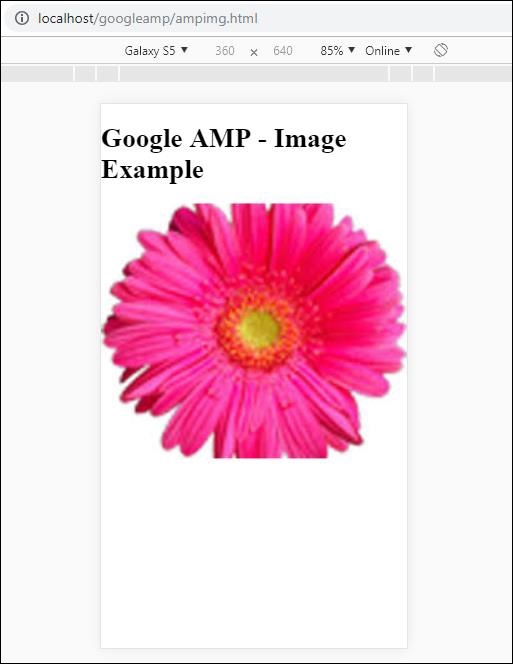Google AMP - Imagens
As imagens usadas na página AMP do Google são semelhantes a como são usadas em uma página html padrão, mas a única diferença é a maneira como o nome da tag é usado com algumas propriedades adicionais. Este capítulo discute isso em detalhes.
Observe as sintaxes mostradas abaixo -
HTML padrão
<img src = ”example.jpg” width = ”300” height = ”250” alt = ”Example” ></img>Na página AMP
<amp-img src = "example.jpg" alt = "Example" height = "300" width = "250" ><//amp-img>Observe que a tag de img é alterado para amp-img.
Por que usar amp-img em vez de img?
O motivo para alterar img para amp-img é ter mais controle sobre o layout da página e a solicitação de rede feita para carregar a imagem. O Amp adiciona carregamento lento ao recurso de imagem e prioriza o carregamento de acordo com outros recursos disponíveis na página.
Exemplo
Observe o seguinte código para um melhor entendimento -
<!doctype html>
<html amp lang = "en">
<head>
<meta charset = "utf-8">
<script async src = "https://cdn.ampproject.org/v0.js"></script>
<title>Google AMP - Image</title>
<link rel = "canonical" href = "http://example.ampproject.org/articlemetadata.html">
<meta name = "viewport" content = "width = device-width,
minimum-scale = 1,initialscale = 1">
<style amp-boilerplate>
body{
-webkit-animation:
-amp-start 8s steps(1,end) 0s1 normal both;-moz-animation:
-amp-start 8s steps(1,end) 0s 1 normal both;-msanimation:
- amp-start 8s steps(1,end) 0s 1 normal both;animation:
-amp-start 8s steps(1,end) 0s 1 normal both
}
@-webkit-keyframes
-ampstart{from{visibility:hidden}to{visibility:visible}}@-moz-keyframes
-ampstart{from{visibility:hidden}to{visibility:visible}}@-ms-keyframes
-ampstart{from{visibility:hidden}to{visibility:visible}}@-o-keyframes
-ampstart{from{visibility:hidden}to{visibility:visible}}@keyframes
amp-start{from{visibility:hidden}to{visibility:visible}}
</style>
<noscript>
<style amp-boilerplate>
body{
-webkit-animation:none;
-moz-animation:none;
-msanimation:none;
animation:none
}
</style>
</noscript>
</head>
<body>
<h1>Google AMP - Image Example</h1>
<amp-img alt = "Beautiful Flower" src = "images/flower.jpg"
width = "246"
height = "205">
</amp-img>
</body>
</html>Resultado
Ao executar o código mostrado acima, você encontrará o resultado conforme mostrado abaixo -

Você também pode tornar a imagem responsiva adicionando a propriedade layout = ”responsive” à tag amp-img conforme mostrado abaixo
Exemplo
Observe o seguinte código para um melhor entendimento -
<amp-img alt = "Beautiful Flower" src = "images/flower.jpg"
width = "246"
height = "205"
layout = "responsive">
</amp-img>Resultado
Ao executar o código mostrado acima, você encontrará o resultado conforme mostrado abaixo -
